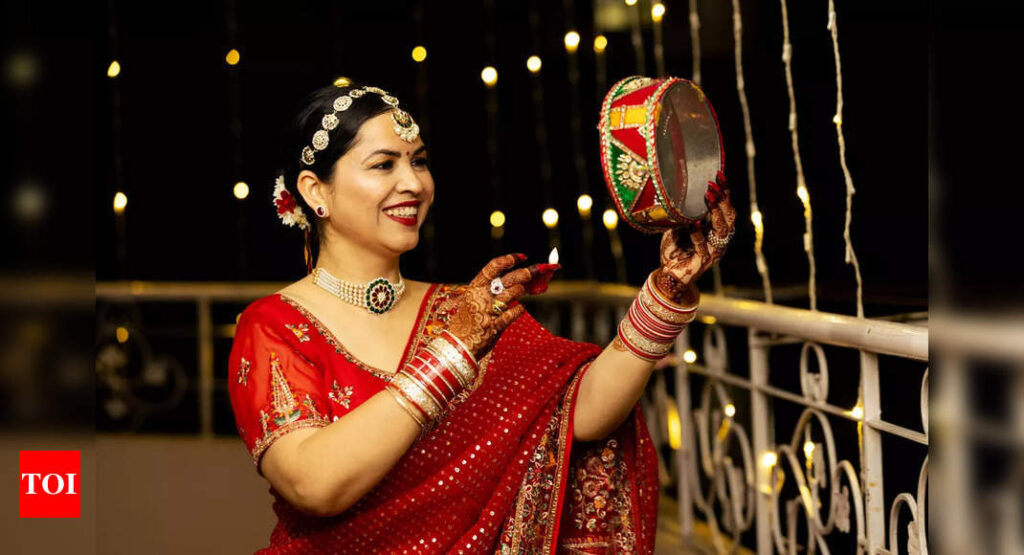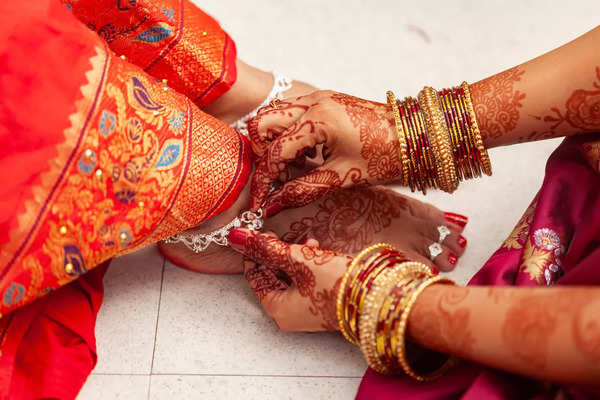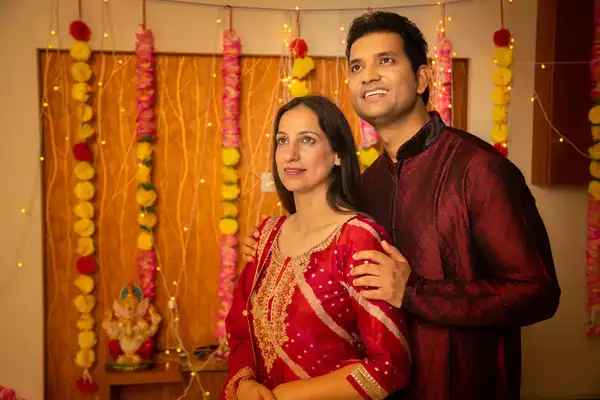Why do women wear red clothes on Karwa Chauth?

Karwa Chauth is a significant festival celebrated by married Indian women, who abstain from water and food from sunrise to moon rise for their husband’s long life and health. One of the most obvious characteristics of this festival is wearing red dresses, which has far-reaching cultural and symbolic values. Let’s discuss the importance of this hue on this special day.
Significance of red
Symbol of prosperity and fertility: In Indian culture, red is often associated with auspiciousness, prosperity, and fertility.It is believed to bring good fortune and happiness, making it a fitting colour for a festival that celebrates marital love and devotion. Wearing red is seen as a way for women to invoke blessings for their families.
Tradition and custom: The tradition of red during Karwa Chauth dates back to history. In several Indian cultures, red has always been associated with bridal wear. It is symbolic of love, passion and marriage. As Karwa Chauth is the celebration of married life, wearing red brings women closer to the traditions that have been passed to them through generations.

Representation of love: Red colour is associated with love and romance. By wearing this colour, women express their affection and commitment to their husbands. The vibrant hue symbolizes the deep emotional bond that married couples share, making it an ideal choice for a day dedicated to celebrating that relationshi
Cultural practices
Regional differences: Though red is the colour which still dominates Karwa Chauth, regional differences can also be observed. After all, in some regions, other bright colours are also very much preferred by women, but red remains central as it is too symbolic. For instance, in parts of North India, maroon and pink shades are also quite a lot in vogue.
Not to forget, they adorne the reddish tones of their apparel by using red bangles, bindis, and even some mehendi designs. The accessories go perfectly well with the garments donned and mark in the festive mood associated with the celebration of this particular day.
Rituals and ceremonies: The rituals performed on Karwa Chauth often include wearing traditional attire as part of the observance. During the puja (prayer ceremony), women gather and share their experiences while dressed in vibrant red, creating a visual representation of unity and tradition.
Modern dimensions of Karwa Chauth
Fashion trends: With more or less traditionalistic roles, contemporary fashion has equally influenced the attitudes of women regarding Karwa Chauth. Various styles and fabrics have been offered by modern designers to allow red to be an integral part of the attire, while not deemed a crime to have individuality without deviating from tradition.

Embracing individuality: Many women today choose to incorporate personal touches to their outfits. While red remains a central theme, they might blend it with other colours or patterns that reflect their style, demonstrating how tradition can coexist with modernity.
Inclusivity: The celebration of Karwa Chauth is evolving, with increasing participation from women across different backgrounds, including those who may not strictly adhere to the fasting ritual. This inclusivity is reflected in a wider interpretation of the festival’s attire, though red still holds a special place.
The emotional aspect
Empowerment and community: Wearing red on Karwa Chauth also fosters a sense of community among women. As they dress in similar colors, they unite in their devotion and commitment, creating a bond that strengthens friendships and familial ties.
Bollywood actresses looked beautiful on Karva Chauth 2023! Watch IT
The tradition of wearing red on Karwa Chauth is steeped in cultural significance, symbolism, and emotional depth. It serves as a powerful reminder of the devotion women have for their husbands and the importance of marital bonds. As customs evolve, the essence of Karwa Chauth remains intact, with red clothing standing as a vibrant testament to love, tradition, and the enduring spirit of womanhood. Whether through contemporary interpretations or traditional practices, the colour red continues to illuminate this cherished festival, enriching the lives of those who celebrate it.








